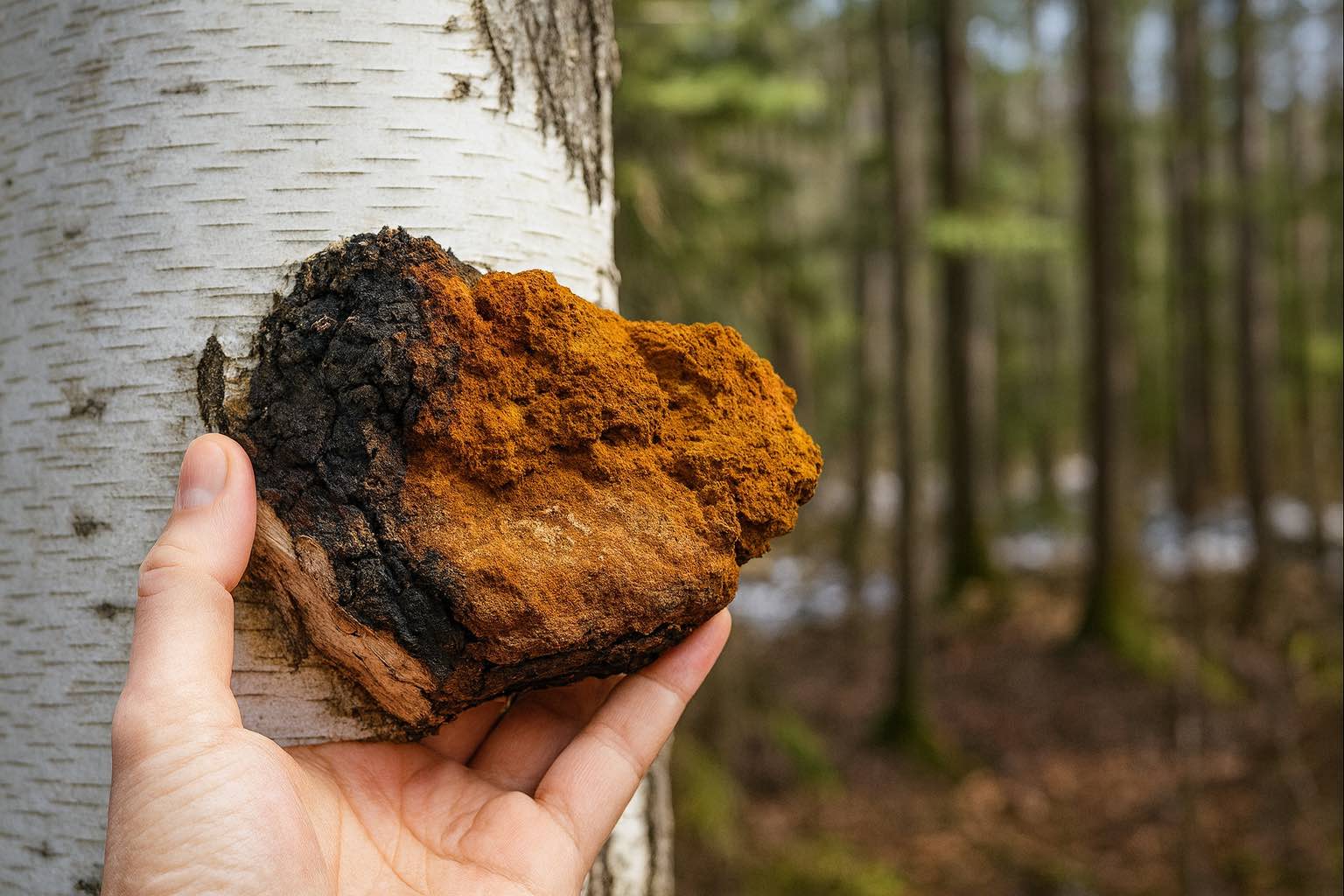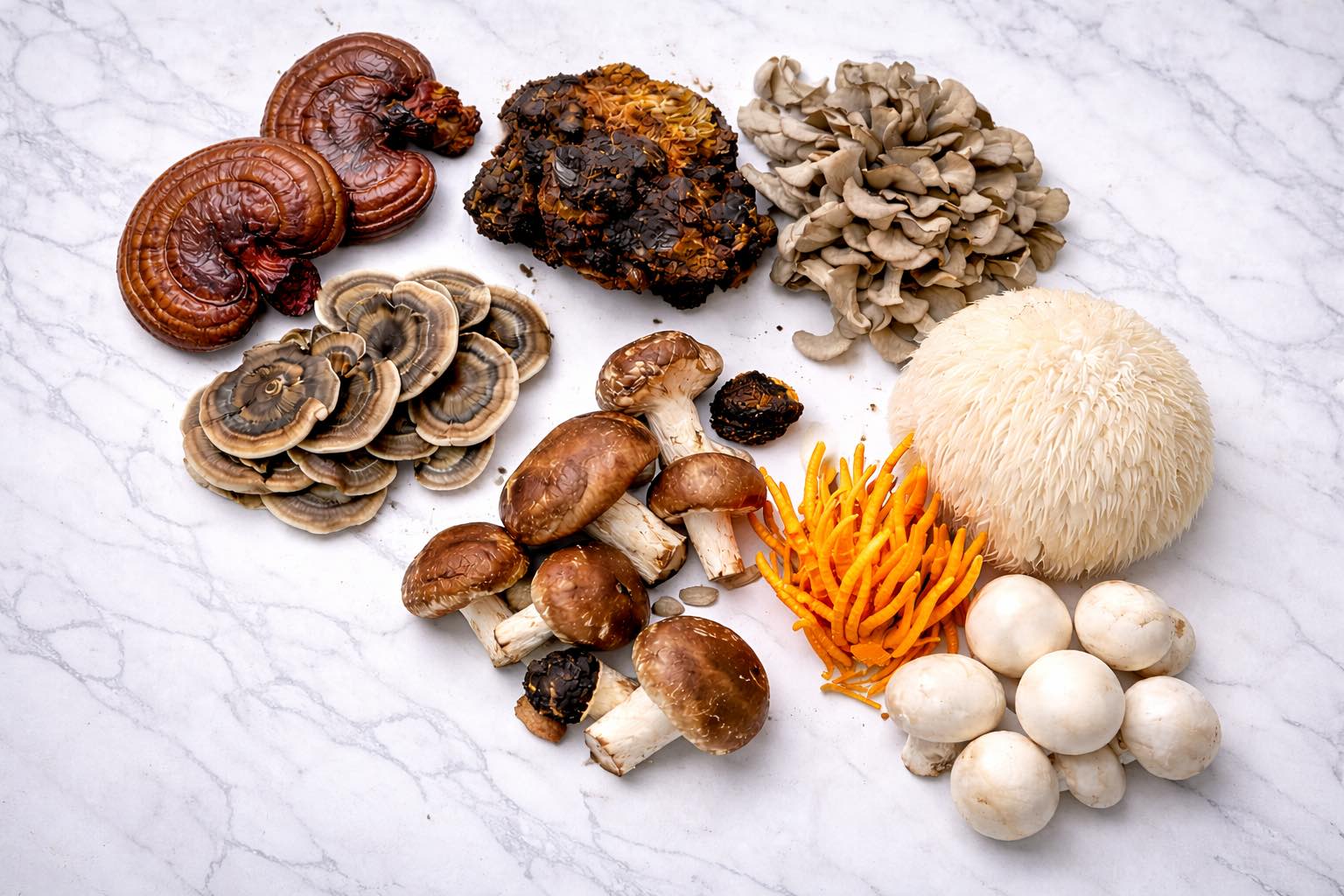Betulin and its derivative betulinic acid are abundant in chaga mushrooms and throughout nature. These potent compounds provide chaga with anti-inflammatory benefits, immune system support, and skin rejuvenation. Researchers are all studying betulin and betulinic acid for their novel cancer-fighting abilities.
This article explains the importance of betulin in chaga mushrooms, the state of the chaga market, and why mushroom testing for betulin is essential.
Betulin and Betulinic Acid in Chaga Mushrooms
Belutin occurs naturally in white birch tree species in the northern latitudes across Alaska, Canada, Europe, and Asia. Chaga mushrooms absorb these compounds as they grow along the bark.
- Betulin is a triterpene, a member of the terpene family consisting of 30 carbon atoms. Terpenes are compounds found in plants and fungi that often play roles in growth, defense, and survival.
- Betulinic acid is an essential natural derivative of betulin, formed from oxidative reactions. Betulinic acid occurs naturally in many foods and plants, such as the sour jujube fruit, papaya, and persimmon.
Therapeutic Benefits
Betulin and its derivative, betulinic acid, exert their effects by modulating key cellular pathways, contributing to their anti-cancer, anti-inflammatory, and skin-protective properties.
Here's how they work:
Anti-Cancer mechanisms:
Betulin directly targets mitochondria, the "powerhouses" of cells responsible for energy production. By disrupting mitochondrial function, betulin triggers apoptosis (programmed cell death) in tumor cells, particularly in cases where traditional chemotherapy proves ineffective. This mitochondrial pathway has sparked interest in new anti-cancer research and potential treatments.
Skin protecting mechanisms:
Betulin promotes keratinocyte differentiation, a process where skin cells mature and form a tough yet flexible barrier. This barrier protects the body from environmental damage while maintaining healthy skin tissue.
Anti-Inflammatory mechanisms:
Betulin reduces inflammation by inhibiting the production of cytokines, molecules that regulate immune responses. This anti-inflammatory action may help mitigate chronic inflammation and related conditions.
Antioxidant mechanisms:
Betulinic acid has a dual effect on reactive oxygen species (ROS), unstable molecules that contain oxygen and can cause cellular damage at high levels. In tumor cells, betulinic acid raises ROS levels to trigger apoptosis. In contrast, betulinic acid helps reduce excessive ROS levels in healthy tissues, preventing oxidative damage and supporting overall cellular health.
Betulin Market and Products
Predictions say the betulin powder industry will reach $91.87 billion by 2031. Key drivers behind the surge in popularity of betulin and the Chaga market include:
- Betulin’s proven therapeutic benefits
- Consumer demand for natural, plant-based products
- Advancements in pharmaceutical research
Industries using betulin
Betulin’s diverse applications benefit many product types across varying industries, especially those related to health and wellness. Industries that are currently capitalizing on betulin and betulinic acid from Chaga and are expected to grow the market in the future include:
- Pharmaceuticals (with an emphasis on treating cancer and infectious diseases)
- Cosmetics (natural skincare and anti-aging products)
- Nutraceuticals (diet supplements that also treat diseases)
- Food and beverages (such as tea and coffee)
Top Betulin Products
Products featuring betulin range from cutting-edge health supplements and cosmetics to hemp mushroom blends and Chaga mushroom tea with CBD. Some top products featuring betulin include:
- Sayan Siberian Chaga Mushroom Extract with Betulin enriches freeze-dried Chaga extract with 5% pure betulin from birch tree bark. The exclusive blend contains antioxidants, polysaccharides, and essential vitamins and minerals for immune system support and overall wellness.
- Sylveco Sea Buckthorn Cream with Betulin uses the soothing and regenerative powers of betulin and betulinic acid to moisturize skin and alleviate irritations. The formula rebuilds the skin’s natural protective barrier and heals skin showing signs of damage or inflammation.
Why Must Mushroom Brands Test Their Chaga Products for Betulin?
Mushroom potency testing quantifies active compounds in chaga mushrooms, including betulin. This information is critical for mushroom brands to find suppliers with the purest formulas, differentiate themselves in a fast-growing market, and validate their products’ quality and effectiveness.
Unfortunately, imposter mushroom products void of active ingredients like betulin riddle the Chaga market. So-called “fake chaga” shows up in two main ways:
- Chaga grown on myceliated grain: Chaga grown on myceliated grain or brown rice flour is inexpensive to produce but lacks the natural component found in wild-harvested Chaga. When cultivated on grain, Chaga doesn't have access to the birch bark it needs to absorb betulin, meaning the product is missing one of its most valuable medicinal components.
- Chaga harvested from broken limbs: Chaga harvested from broken limbs or dying trees can lose its betulin potency and medicinal value due to improper growth conditions or decay. Additionally, environmental exposure from broken limbs—such as excessive moisture, mold growth, or contamination—can degrade its nutritional and therapeutic properties.
Mushroom testing can help Chaga brands find reliable suppliers that provide genuine, fresh betulin-filled fruit and extracts.
Building Brand Quality and Trust
Publishing functional mushroom testing results also helps brands build trust with consumers, who often gravitate to products with transparent, verified ingredients.
- Verifies quality: The U.S. Food and Drug Administration (FDA) doesn’t regulate mushroom supplements and extracts, so mushroom testing is the only way for brands to verify the quality of their Chaga mushroom products.
- Better marketing: Authenticating product ingredients also gives brands priceless marketing material they can display on labels and websites, setting themselves apart in the ever-growing Chaga mushroom marketplace.
The Bottom Line
Betulin and betulinic acid are the main compounds in Chaga mushrooms that give these fungi species notable health benefits, from improving skin to fighting cancer cells. Testing betulin with reliable third-party mushroom laboratories is necessary to find pure and effective Chaga extracts.
ACS Laboratory is a leader in functional mushroom testing, working with everything from extracts and supplements to drinks and hemp mushroom blends.
Brands interested in harnessing powerful bioactive components like betulin can contact ACS to start testing today.









.png)




.png)
.png)
.png)
.png)